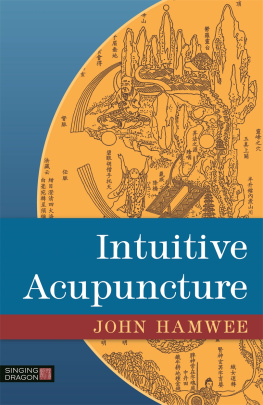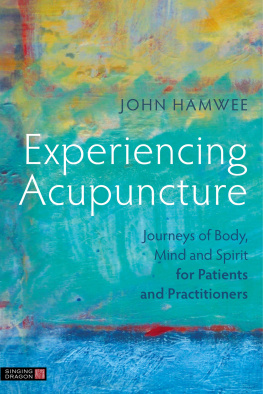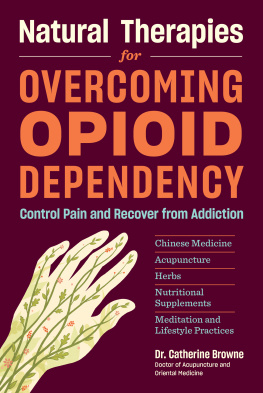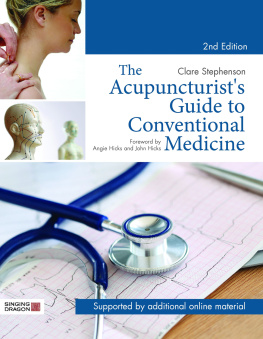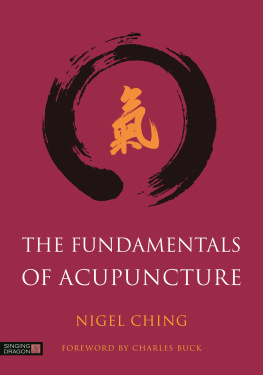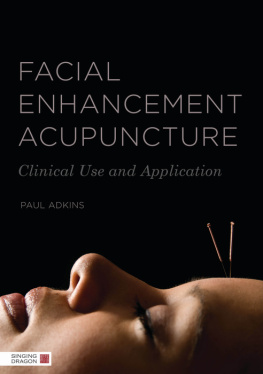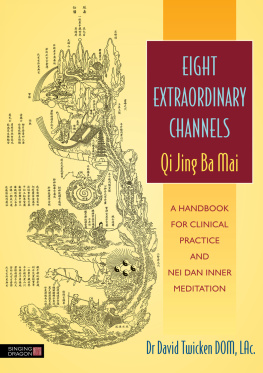Hamwee - Acupuncture for new practitioners
Here you can read online Hamwee - Acupuncture for new practitioners full text of the book (entire story) in english for free. Download pdf and epub, get meaning, cover and reviews about this ebook. City: London, year: 2012;2015, publisher: Jessica Kingsley Publishers, genre: Religion. Description of the work, (preface) as well as reviews are available. Best literature library LitArk.com created for fans of good reading and offers a wide selection of genres:
Romance novel
Science fiction
Adventure
Detective
Science
History
Home and family
Prose
Art
Politics
Computer
Non-fiction
Religion
Business
Children
Humor
Choose a favorite category and find really read worthwhile books. Enjoy immersion in the world of imagination, feel the emotions of the characters or learn something new for yourself, make an fascinating discovery.
Acupuncture for new practitioners: summary, description and annotation
We offer to read an annotation, description, summary or preface (depends on what the author of the book "Acupuncture for new practitioners" wrote himself). If you haven't found the necessary information about the book — write in the comments, we will try to find it.
Hamwee: author's other books
Who wrote Acupuncture for new practitioners? Find out the surname, the name of the author of the book and a list of all author's works by series.
Acupuncture for new practitioners — read online for free the complete book (whole text) full work
Below is the text of the book, divided by pages. System saving the place of the last page read, allows you to conveniently read the book "Acupuncture for new practitioners" online for free, without having to search again every time where you left off. Put a bookmark, and you can go to the page where you finished reading at any time.
Font size:
Interval:
Bookmark:

Intuitive Acupuncture
by the same author
Acupuncture for New Practitioners
John Hamwee
ISBN 978 1 84819 102 0
eISBN 978 0 85701 083 4
Zero Balancing
Touching the Energy of Bone
John Hamwee
Foreword by Fritz Smith, MD FCCAc
Illustrations by Gina Michaels
ISBN 978 1 84819 234 8
eISBN 978 0 85701 182 4
of related interest
Acupuncture and Chinese Medicine
Roots of Modern Practice
Charles Buck
ISBN 978 1 84819 159 4
eISBN 978 0 85701 133 6
Essential Texts in Chinese Medicine
The Single Idea in the Mind of the Yellow Emperor
Richard Bertschinger
ISBN 978 1 84819 162 4
eISBN 978 0 85701 135 0
Developing Internal Energy for Effective Acupuncture Practice
Zhan Zhuang, Yi Qi Gong and the Art of Painless Needle Insertion
Ioannis Solos
ISBN 978 1 84819 183 9
eISBN 978 0 85701 144 2
Intuitive
Acupuncture
JOHN HAMWEE

LONDON AND PHILADELPHIA
First published in 2016
by Singing Dragon
an imprint of Jessica Kingsley Publishers
73 Collier Street
London N1 9BE, UK
and
400 Market Street, Suite 400
Philadelphia, PA 19106, USA
www.singingdragon.com
Copyright John Hamwee 2016
All rights reserved. No part of this publication may be reproduced in any material form (including photocopying or storing it in any medium by electronic means and whether or not transiently or incidentally to some other use of this publication) without the written permission of the copyright owner except in accordance with the provisions of the Copyright, Designs and Patents Act 1988 or under the terms of a licence issued by the Copyright Licensing Agency Ltd, Saffron House, 610 Kirby Street, London EC1N 8TS. Applications for the copyright owners written permission to reproduce any part of this publication should be addressed to the publisher.
Warning: The doing of an unauthorised act in relation to a copyright work may result in both a civil claim for damages and criminal prosecution.
Library of Congress Cataloging in Publication Data
Hamwee, John, author.
Intuitive acupuncture / John Hamwee.
p. ; cm.
Includes bibliographical references.
ISBN 978-1-84819-273-7 (alk. paper)
I. Title.
[DNLM: 1. Acupuncture. 2. Intuition. WB 369]
RM184
615.892--dc23
2015021616
British Library Cataloguing in Publication Data
A CIP catalogue record for this book is available from the British Library
ISBN 978 1 84819 273 7
eISBN 978 0 85701 220 3
For Cathy
Acknowledgements
My first debt is to my teachers: Meriel Darby, Angie and John Hicks and Dr Fritz Smith.
I am grateful to those who, by generously sharing their wisdom and experience, have made it a much better book than I could have written on my own: Myra Connell, Jenny Craig, Sophie Mitchell, Frances Turner, James Unsworth and Allegra Wint.
Jessica Kingsley has been a wonderful publisher and I could not have written this without her support, encouragement and expertise.
And finally my thanks go to all my patients who have allowed me to practise on them and learn from each treatment.
Contents
Preface
This is not a how to do it book, still less a how you ought to do it book. My aim is to help you become more aware of your own innate skills and to appreciate some of the things you already do in the treatment room, though perhaps without fully realising what they are and how valuable they can be. I hope too that it will increase your sensitivity to those skills so that you can use them more often and with more confidence; partly because there is satisfaction in that, but also because I think it will enable you to meet the needs of your patients with more accuracy and clarity.
A colleague I much admire and respect, a more experienced practitioner than me, commented on an earlier book Id written that she really liked the quotes. I almost took offence. I almost heard her say that the only parts of the book she liked were precisely the ones I hadnt written. But then I saw the value in what she was saying. In the course of my reading I had come across wonderful ideas, remarkable perceptions, flashes of brilliance by writers with deep wisdom and a command of language. Why wouldnt I want to use their words instead of mine? Thats why youll find so many quotes in this book. Here is the first, by Ted Kaptchuk:
Stephanus, a sixth century Greek doctorsaid that medicine suffers from a fundamental contradiction; its theory grasps universals while its practice deals with individuals. (Kaptchuk 1989, p.104)
As we struggle to find the right diagnosis or to understand why a treatment seems not to be working as it should, it is a comfort to realise that we are indeed on the horns of a dilemma, and an inescapable one at that. Most of the time we just live with it and manage to get by. But one of the gifts of intuition is that it can swerve us past those horns. In a moment of insight you can suddenly arrive at a diagnosis that is in all the books and also fits the unique patient in front of you perfectly; or you craft a highly individualised treatment for an unusual condition and later realise that what you have done is an exemplar of something described in the Nei Jing.
And just in case you suspect that intuition is something only for rather weird or way-out practitioners, here is what one genius, J.M. Keynes, said of another. Writing of Sir Isaac Newton, perhaps the most famous scientist of them all, he commented, I fancy his pre-eminence is due to his muscles of intuition being the strongest and most enduring with which a man had ever been gifted (Keynes, cited in Myers 2002, p.61).
CHAPTER 1
Intuition
Thirty years ago a woman sat at her kitchen table. She looked up and saw a man she didnt know walking past the window. She said to herself, Im going to marry him. She did, and they have been married ever since.
A well-known novelist recently spoke of a similar experience. I walked up a field Id not walked up before and over the brow of the field there appeared the ridge line of a house, and by the time Id reached the house, and I cant explain this, I knew it was the only place I could possibly live (Garner 2014). And he has lived there for over fifty years.
Perhaps the reason these examples are so striking is simply because the predictions came true; maybe we all have what we think of as astonishing insights, but the overwhelming majority of them turn out to be wrong and so are forgotten. Even so, there is something compelling about these stories. They seem to open a window onto a truth that we dont normally encounter in our everyday thoughts and plans.
Experiences like these are highly valued in a number of Eastern traditions and whole disciplines have been developed to foster them. A well-known example comes from the practice of Zen Buddhism, where the student is instructed to ponder such imponderables as the look of her face before she was born or the sound of one hand clapping. There is no possibility of finding an answer through the normal processes of thought and enquiry which is, of course, the whole point. Sartori [Japanese for awakening] really designates the sudden and intuitive way of seeing into anythingone seeks and seeks but cannot find. One then gives up and the answer comes by itself (Watts 1962, p.181).
If not exactly fostered by conventional medical practice and procedures, there is at least a recognition that the times when the answer comes by itself are both common and valid. The best [doctors] seem to have sixth sense about disease. They feel its presence, know it to be there, perceive its gravity before any intellectual process can define, catalog, and put it into words (LaCombe, cited in Mukherjee 2011, p.128).
Next pageFont size:
Interval:
Bookmark:
Similar books «Acupuncture for new practitioners»
Look at similar books to Acupuncture for new practitioners. We have selected literature similar in name and meaning in the hope of providing readers with more options to find new, interesting, not yet read works.
Discussion, reviews of the book Acupuncture for new practitioners and just readers' own opinions. Leave your comments, write what you think about the work, its meaning or the main characters. Specify what exactly you liked and what you didn't like, and why you think so.

